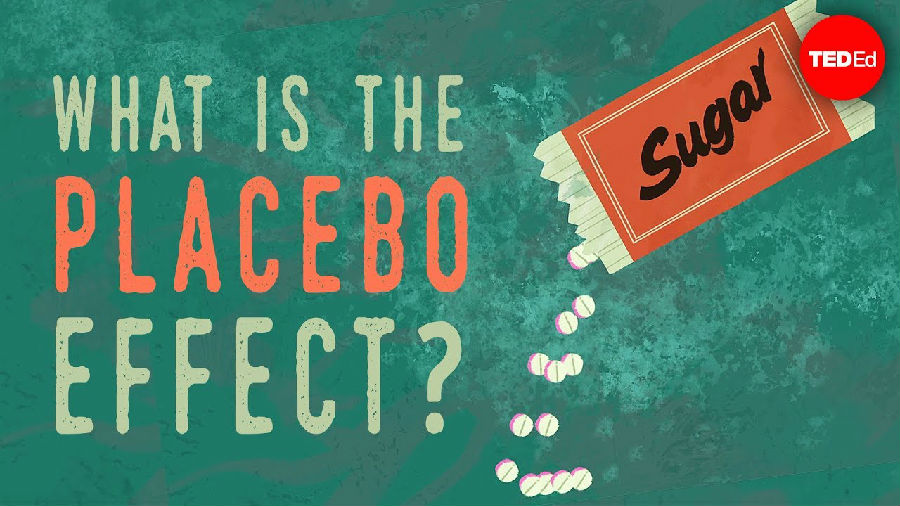(单词翻译:单击)
In 1996, 56 volunteers took part in a study to test a new painkiller called Trivaricaine.
1996年,56个志愿者参加了一项研究,测试一种名叫Trivaricaine的止痛药。
On each subject, one index finger was covered in the new painkiller while the other remained untouched.
每个实验对象的一个食指涂上这个新型止痛药,另一个食指保持原样。
Then, both were squeezed in painful clamps.
然后,两个食指都用钳子使劲夹住。
The subjects reported that the treated finger hurt less than the untreated one.
实验对象都表示那个涂了药的食指没有另一只疼。
This shouldn't be surprising, except Trivaricaine wasn't actually a painkiller,
这本应该没什么好惊讶的,除了Trivaricaine本身并不是一种止痛药以外,
just a fake concotion with no pain-easing properties at all.
只是一个假的混合物,没有任何缓解疼痛的成分。
What made the students so sure this dummy drug had worked?
是什么让这些学生坚信这个假冒的药有效的呢?
The answer lies in the placebo effect,
答案就是安慰剂效应,
an unexplained phenomenon wherein drugs, treatments, and therapies that aren't supposed to have an effect,
一种至今原因不明的现象,发生在使用那些本应该没有效果的药物、手术和治疗上,
and are often fake, miraculously make people feel better.
一般都是假的,却奇迹般地使人们感到好转。
Doctors have used the term placebo since the 1700s when they realized the power of fake drugs to improve people's symptoms.
医生们从18世纪开始使用安慰剂这个术语,那时他们开始意识到假药的作用,能够改善病人的症状。
These were administered when proper drugs weren't available, or if someone imagined they were ill.
当合适的药品短缺时,他们会使用这种治疗方法,或者有些人幻想自己生病的时候。
In fact, the word placebo means 'I shall please' in Latin, hinting at a history of placating troubled patients.
实际上,安慰剂这个词在拉丁语里是“我会好起来”的意思,暗示着安抚受病痛折磨的病人已有一段历史。
Placebos had to mimic the real treatments in order to be convincing,
安慰剂要模仿真正的治疗以达到使人信服的目的,
so they took the form of sugar pills, water-filled injections, and even sham surgeries.
所以他们选择糖丸,注射水,甚至假手术的形式。
Soon, doctors realized that duping people in this way had another use: in clinical trials.
很快,医生意识到这样蒙骗人们还有另一种用途:用于临床试验。
By the 1950s, researchers were using placebos as a standard tool to test new treatments.
直到二十世纪五十年代,研究人员将安慰剂作为一种标准工具,来测试新的治疗方法。
To evaluate a new drug, for instance, half the patients in a trial might receive the real pill.
例如,测试一种新药,一半的临床病人可能会服用真的药丸。
The other half would get a placebo that looked the same.
另一半则会服用看起来一模一样的安慰剂。
Since patients wouldn't know whether they'd received the real thing or a dud,
因为病人并不知道他们服用的是真的药还是个没用的,
the results wouldn't be biased, researchers believed.
所以研究人员相信结果是准确的。
Then, if the new drug showed a significant benefit compared to the placebo, it was proved effective.
于是,如果这种新药比起安慰剂对病人有很明显的改善,那么这种新药就是有效的。
Nowadays, it's less common to use placebos this way because of ethical concerns.
如今,通过安慰剂的这种方法已经不常见了,因为涉及到道德问题。

If it's possible to compare a new drug against an older version, or another existing drug,
只要能够将新药和以前的药或者其他存在的药对比,
that's preferable to simply giving someone no treatment at all, especially if they have a serious ailment.
就比完全不给病人提供治疗要好,尤其是病人患有十分严重的疾病时。
In these cases, placebos are often used as a control to fine-tune the trial
在这些情况下,安慰剂常用于控制变量来微调试验,
so that the effects of the new versus the old or alternative drug can be precisely compared.
这样新药的效果能够与以前的药或者其他代替药更准确的比较。
But of course, we know the placebos exert their own influence, too.
当然,我们知道安慰剂也发挥着其自身的作用。
Thanks to the placebo effect, patients have experienced relief from a range of ailments,
多亏了安慰剂效应,很多病的病人病情得到缓解,
including heart problems, asthma, and severe pain, even though all they'd received was a fake drug or sham surgery.
包括心脏问题、哮喘,还有剧痛,即使他们只是服用了假药或者经历了假手术。
We're still trying to understand how.
我们仍在尝试去理解其背后的原因。
Some believe that instead of being real, the placebo effect is merely confused with other factors,
有些人认为,安慰剂效果都不是真的,仅仅是被其他因素所迷惑了,
like patients trying to please doctors by falsely reporting improvements.
只是病人为了取悦医生而错误地报告病情。
On the other hand, researchers think that if a person believes a fake treatment is real,
另一方面,研究人员认为如果一个人相信假药的可行性,
their expectations of recovery actually do trigger physiological factors that improve their symptoms.
他们对康复的期待程度才是触发心理因素的关键,是改善病症的关键。
Placebos seem to be capable of causing measurable change in blood pressure, heart rate, and the release of pain-reducing chemicals, like endorphins.
安慰剂看起来是可以对血压、心率以及减轻痛觉的化学物质的释放有显著作用的,就像安多芬。
That explains why subjects in pain studies often say placebos ease their discomfort.
这也解释了为什么实验对象在痛觉研究时经常感觉安慰剂缓解了他们的不适。
Placebos may even reduce levels of stress hormones, like adrenaline, which can slow the harmful effects of an ailment.
安慰剂甚至能够降低应激激素水平,如肾上腺素,它是可以缓解病症不良反应的。
So shouldn't we celebrate the placebo's bizarre benefits? Not necessarily.
所以我们应不应该庆幸安慰剂的神奇功效呢?不一定。
If somebody believes a fake treatment has cured them,
如果有的人相信假的治疗方法可以治愈他们,
they may miss out on drugs or therapies that are proven to work.
他们可能会忽略真正被证明有效的药物和治疗。
Plus, the positive effects may fade over time, and often do.
另外,这些有效的作用可能会随着时间的流逝而消失,而且普遍都是。
Placebos also cloud clinical results, making scientists even more motivated to discover how they wield such power over us.
安慰剂总是影响诊断结果,使得科学家们更有动力研究安慰剂是如何产生如此巨大影响的。
Despite everything we know about the human body,
尽管我们了解人体的各个方面,
there are still some strange and enduring mysteries, like the placebo effect.
但仍有很多奇怪的、仍然存在的未解之谜,比如安慰剂效应。
So what other undiscovered marvels might we contain?
那么我们还有些什么没有被发现的奇迹呢?
It's easy to investigate the world around us
探索这个世界很容易,
and forget that one of its most fascinating subjects lies right behind our eyes.
人们也很容易遗忘这个世界上最迷人的事物就是我们自己。


